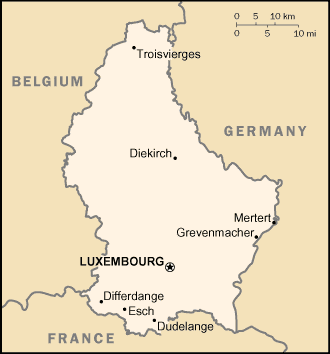Luxembourg
- Alternate uses: Luxembourg (disambiguation)
The Grand Duchy of Luxembourg (also Luxemburg) is a landlocked country in north-west Europe, bordered by France, Germany and Belgium.
| ||||
| National motto: Mir wëlle bleiwe wat mir sin (Luxembourgish, We wish to stay what we are [Meaning: we wish to stay independant]) | ||||
 | ||||
| Official languages | French, German, (Luxembourgish) | |||
| Capital | Luxembourg | |||
| Grand Duke | Grand Duke Henri | |||
| Prime minister | Jean-Claude Juncker | |||
| Area - Total - % water | Ranked 166th 2,586 km² Negligible | |||
| Population
- Density | Ranked 168th 442,972 171/km² | |||
| Independence - Declared - Recognised | 1835 May 11, 1867 | |||
| Currency | Euro(€)¹, Lux. euro coins | |||
| Time zone | UTC +1 | |||
| National anthem | Ons Hémécht | |||
| Internet TLD | .LU | |||
| Calling Code | 352 | |||
| (1) Prior to 1999: Luxembourg franc | ||||
History
Main article: History of Luxembourg
The recorded history of the Grand Duchy of Luxembourg begins with the construction of Luxembourg Castle in the middle ages. Around this fortress a town gradually developed, which became the centre of a small but important nation of great strategic value to France, Germany and the Netherlands. After centuries of conquest and rule by foreign states, Luxembourg eventually became an independent neutral nation in the nineteenth century.
However, the country was repeatedly attacked by Germany in the twentieth century, which led it to abandon its policy of neutrality after World War II, when it became a founding member of NATO, the United Nations and the European Economic Community (later the European Union).
Politics
Main article: Politics of Luxembourg
Luxembourg has a parliamentary form of government with a constitutional monarchy by inheritance. Under the constitution of 1868, executive power is exercised by the Grand Duke and the cabinet, which consists of a prime minister and several other ministers.
Legislative power is vested in the Chamber of Deputies, elected directly to 5-year terms. A second body, the "Conseil d'Etat" (Council of State), composed of 21 ordinary citizens appointed by the Grand Duke, advises the Chamber of Deputies in the drafting of legislation.
Districts
Main article: Districts of Luxembourg
Luxembourg is divided in to three administrative subdivisions, or districts:
Geography
Main article: Geography of Luxembourg
The north of the country, part of the Ardennes, has hills and low mountains, with the Burgplatz as the highest point at 559 m. The rest of the country is also hilly.
Luxembourg's eastern border is formed by two rivers, the Moselle and the Our.
The capital Luxembourg is the largest city of the country. Other important cities are Esch-sur-Alzette (a.k.a. Esch), to the south-west of the capital, and Echternach, against the German border in the east.
Economy
Main article: Economy of Luxembourg
The stable, high-income economy features moderate growth, low inflation, and low unemployment. The industrial sector, until recently dominated by steel, has become increasingly more diversified to include chemicals, rubber, and other products. During the past decades, growth in the financial sector has more than compensated for the decline in steel. Services, especially banking, account for a growing proportion of the economy. Agriculture is based on small family-owned farms. Luxembourg has especially close trade and financial ties to Belgium and the Netherlands, and as a member of the EU, enjoys the advantages of the open European market.

Demographics
Main article: Demographics of Luxembourg
As a small country, much of the population of Luxembourg originates from neighbouring countries, and there are three languages spoken. Besides French (spoken in neighbouring Belgium and France) and German (Germany), Luxembourgish is spoken. There are sizeable minorities of Italian and Portuguese speakers.
Most Luxembourgers adhere to the Roman Catholic faith.
Culture
Main article: Culture of Luxembourg
The language of Luxembourg is Luxembourgish, a blend of old German and Frankish elements. The official language of the civil service, law, and parliament is French, although criminal and legal debates are conducted partly in Luxembourgish and police case files are recorded in German. German is the primary language of the press. French, German and English are taught in the schools, with German spoken mainly at the primary level; French and English at the secondary level.
Miscellaneous topics
- Communications in Luxembourg
- Transportation in Luxembourg
- Military of Luxembourg
- Foreign relations of Luxembourg
- List of Grand Dukes of Luxembourg
- Royal Family of Luxembourg
- Luxembourg film

